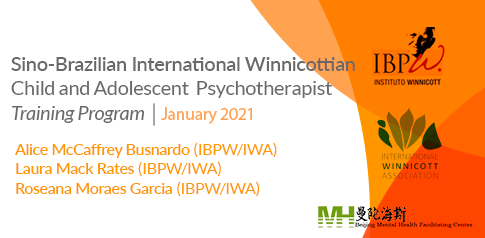Sino-Brazilian International Winnicottian Child and Adolescent Psychotherapist Training Program | January 2021
Brazilian Institute of Winnicottian Psychoanalysis (IBPW)
International Winnicott Association (IWA)
Beijing Mental Health Facilitating
First Module – Period: January 2021
Alice McCaffrey Busnardo Winnicottian Clinical Psychologist. Private practice for the past 20 years. Psychological care of children, adolescents and adults aiming to provide conditions for the recovery from maturational illnesses. Supervisor for psychologists who are initiating their practice according to Donald Winnicott’s guidelines. Master’s degree in Social Psychology at Universidade de São Paulo (2007). Doctor’s degree in Clinical Psychology at Pontifícia Universidade Católica de São Paulo (2012), when the thesis “Creativity and Clinic in Winnicott” was developed. Post-Doctor’s degree at UNICAMP (2014), when the research initiated in the doctoral studies was continued. Member of IBPW (Brazilian Institute of Winnicottian Psychoanalysis), and also member of IBPW’s Research Council. Teacher, Clinical and Research Supervisor in the Training Course in Winnicottian Psychoanalysis at Winnicott’s Psychoanalysis School since 2008. Teacher in Winnicott’s Psychoanalysis Chinese Teacher Candidate Training Programme (2017-2020). Author of several articles, including “A clinical case: on the repercussions derived from a caring attitude when antisocial symptoms first appear” (in the book Winnicott na escola de São Paulo, 2011).
Laura Mack Rates PhD. Psychoanalyst & Clinical Psychologist. With over 10 years of clinical practice is currently working as School Counsellor at the British International School of São Paulo. Besides offering counselling sessions, has developed a Mental Health Prevention Program covering the entire student body of pupils aged between 3-18 years old.
Earned her PhD from State University of Campinas (UNICAMP) in Philosophy under the guidance of Prof. Dr. Zeljko Loparic with a thesis entitled: “Regression to absolute dependence: Winnicott’s clinical innovation”. Prior to that earned her master’s degree in 2011 from PUC-SP in the Clinical Psychology department, under the guidance of Prof. Dr. Alfredo Naffah Neto, with a dissertation entitled: “An investigation of temporality in Winnicott”. Is a member and teacher at IBPW (Brazilian Institute of Winnicottian Psychoanalysis). Lecturer in Winnicott’s Psychoanalysis Chinese Teacher Candidate Programme. Former Executive Secretary of IWA (International Winnicott Association).
Roseana Moraes GarciaDidactic analyst at IBPW, doctor and master in Clinical Psychology at PUC-SP, a specialist in Mental Health in Childhood at FCM-UNICAMP, professor and supervisor of training courses at IBPW and IWA.
Summary of the course
Backed by his theory of the personal maturational development – which also includes the theory of maturational pathology –, Donald W. Winnicott became an innovator in the field of psychotherapeutic childcare. The general objective of this course is to present Winnicott’s child psychiatry, its foundations and fundamental concepts, as well as specific clinical procedures which have been developed by the author (like therapeutic consultations, “partagée” psychoanalysis and on demand therapy) in order to satisfy the different types of needs and pathologies of children that came to him in search for help. This course also intends to explore and discuss children experiences at school as well as the possible appearance of symptoms and pathologies within this context, since the school environment is of extreme importance in children’s lives and should be a facilitating environment for their maturational and socialization processes. Clinical cases assisted by Winnicott will also be presented and discussed.
- Module 1: Winnicott’s maturational process and some aspects of the school life – disturbances within the school context and the importance of the environment.
- Outline of the program
- Time schedule: This first module of Winnicott’s Child Psychiatry course will be 30-hour long, divided in 5 lectures and 5 supervisions, each of them lasting 3 hours.
- Contents
Lecture 1: 01/04/2021 (20h-23h – Beijing time) – by Alice Busnardo, PhD
Winnicott’s concept of maturational health (and ill-health) and the beginning of the maturational process (absolute dependence)
Donald W. Winnicott developed a theory of the personal maturational process from which we are able to understand how the basis of human personality can be constituted as well as what is at stake in each maturational stage, so the baby can grow and develop into a healthy child and afterwards become an adult capable of autonomy and contribution to society without too much loss of the capacity to be creative and to exist in the world in a personal e singular way. In this lecture, we shall approach the concepts of health and ill-health from a winnicottian perspective as well as the first period of the maturational process, named by the author as the period of absolute dependence, in which we are going to find the essential achievements for the organization of a healthy personality – achievements that, according to Winnicott, are totally dependent on the environment facilitation.
Supervision 1: 01/05/2021 (20h-23h – Beijing time) – Supervisor: Alice Busnardo, PhD
Lecture 2: 01/06/2021 (20h-23h – Beijing time) – by Alice Busnardo, PhD
The period of relative dependence and the stage of concern
After going through the period of absolute dependence, if everything goes well, the baby will achieve a first integration on a unity, although yet primary and incipient. On the next stage he must enter the so-called period of relative dependence, which begins with the process of weaning and disillusionment and then goes through the stage of transitionality and the stage of the use of the object, to finally reach the stage of I AM, in which the baby will achieve the unitary status – the baby finds himself at last separated from the environment, he is now a unitary self. From that moment on he will progress in the direction of autonomy by going through the stage of concern, that if faced with success will bring the possibility of integration of his own ambivalence and the acquisition of a sense of responsibility and capacity to contribute. Here, one more time, during all these accomplishments, the environment has an indispensable role and must continue corresponding in an adaptive way to the changing needs of the small individual. Those are the processes that will be presented and discussed in this lecture.
Supervision 2: 01/05/2020 (20h-23h – Beijing time) – Supervisor: Laura Mack, PhD
Lecture 3: 01/08/2021 (20h-23h – Beijing time) – by Alice Busnardo, PhD
The stage of triangular relationships and the period of adolescence
On this lecture we shall introduce the stage of triangular relationships: at this stage, there is now an internal world, in which a whole life of intense and violent fantasies and feelings develop. Instincts and bodily excitations are present in play, and identification occurs with either of the parents. Mixed with the feelings which have been recently integrated and have become meaningful, it is the moments of excitation clearly determined by instinctuality which are most important. We will also present Winnicott’s understanding of the period of adolescence, a stage in which, according to the author, the individual will have to deal with issues like the experience of isolation, a battle between the desire to be independent and the regressive need to remain immature, fantasies involving intense aggressiveness and the anxiety of not feeling real. According to Winnicott, each child reaches puberty with a personality organization that has been established along his first years. If such personality is a healthy one, the child who has been healthy up to this point shall have enough resources to deal with dangerous situations, although he will also have to deal with changes that belong to puberty.
Supervision 3: 01/09/2021 (20h-23h – Beijing time) – Supervisor: Laura Mack, PhD
Lecture 4: 01/10/2021 (20h-23h – Beijing time) – by Laura Mack, PhD
Disturbances of school life (Symptoms and Behaviors within the school context) During the child’s life several symptoms could appear at school. Children spend most of their time at school and it has become imperative to think and address Mental Health at schools.
Mental Health issues that appear within this context are vast: learning disabilities, attention disorders, eating disorders, social inadequacy, phobia, bullying, depression, suicidal tendencies, auto mutilation, gender issues, substance abuse etc. The focal point here, from a mental health perspective, is that these symptoms are most likely first to appear in the school environment. This can be a challenge in many ways, but it is also an opportunity to act at the beginning of symptom formation or even to prevent it from occurring. Symptoms communicate, they are an S.O.S signal. As soon as the maturational need behind the symptom is understood and attended to, the need to maintain the symptom also decreases until finally it disappears.
Supervision 4: 01/11/2021 (20h-23h – Beijing time) – Supervisor: Alice Busnardo, PhD
Lecture 5: 01/12/2021 (20h-23h – Beijing time) – by Laura Mack, PhD
The school as a facilitating environment
We recognize that schools have a responsibility for children’s character, social and emotional wellbeing. Therefore, our goal is to provide an appropriate environment so that pupils can thrive, be healthy and happy. In this context we recognize that teachers can be a positive or negative influence on pupil’s emotional development. Building respectful, trustworthy relationships and focusing on social and emotional skills, rather than solely punishment, to improve behavior and support positive emotional development.
Supervision 5: 01/13/2021 (20h-23h – Beijing time) – Supervisor: Roseana Garcia, PhD

